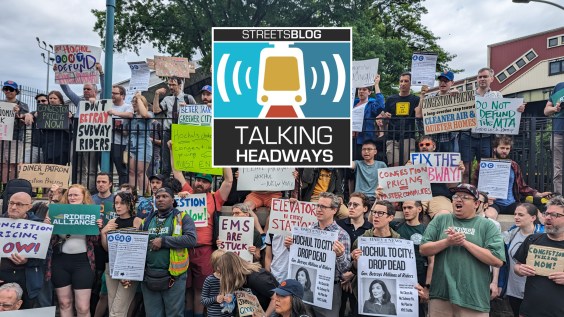Today on the Streetsblog Network, a post from member blog VTA Watch,
which covers the Santa Clara Valley Transit Authority in California.
The blog's author discusses the impact of upcoming service cuts on the
people whose mobility, and ability to participate meaningfully in their
communities, depends on public transit. The post also goes on to argue
that even people who drive cars benefit from the existence of public
transit -- whose ongoing viability is threatened by cutbacks:
Good public transit means she can get where she's going. (Photo: Kieran 2009 via Flickr)
Politically, transit riders get left behind. People who drive
automobiles (which most politicians are) typically do not appreciate
the importance of public transportation, especially local bus service,
because they find most transit unattractive to use.…As unattractive as it may appear to people who have cars, local transit provides independence
for the low income, seniors, the disabled, and teenagers. Although they
cannot travel as fast as those with cars, transit service allows them
independently to access jobs, shopping centers, schools and
hospitals/clinics on their own. Public transportation is generally
safer, less expensive, more dependable and environmentally superior to
any other alternatives, including owning unsafe and uninsured
clunkers to get around. Although transit services may appear optional
and less important than other societal priorities, transit serves as a
critical link for many to these other priorities, a means to an end.The current transit funding crisis is threatening the future success of
transit service. Like most businesses, transit services need time to
grow its ridership base. It is generally unrealistic to expect full
trains and buses on the first day of the new service. With periodic
service reductions (and especially service eliminations), riders who
come to depend on the service have to make important adjustments, and
which may cause them to abandon transit altogether. Even if the service
could be restored in a few years, that same rider may not come back.…Of course transit also provides independence for
those who drive cars. With high quality transit, car owners can choose
not drive to certain places and free themselves from high parking fees,
and families who might need two or more cars can cut down to just one.
Parents would not have to always drive their kids around, and adult
children would not have to always drive their elderly parents around.
More from around the network: A funny riff from Boston Biker on sharing the road. The Transport Politic on alternative bus networks, like the one just introduced in Baltimore. And Austin on Two Wheels with an update on a proposed bike boulevard in that city.





